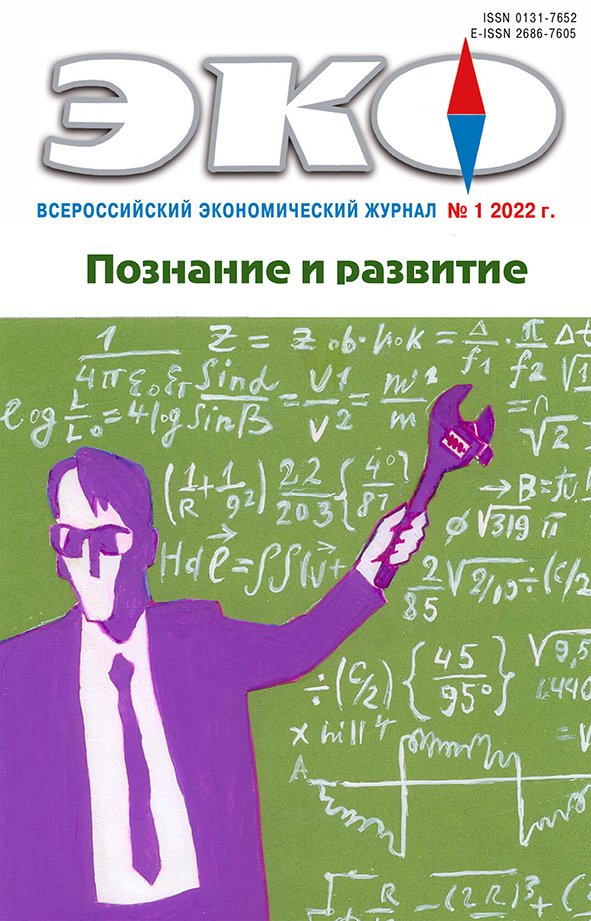Cover story: Cognition and Development
Movement towards Autarky in Russian Science through the Prism of International Cooperation
Published 2021-12-29
Keywords
- autarchy; science; international cooperation; circulation of workforce; state governance; funding
How to Cite
1.
Dezhina И, Egerev С. Movement towards Autarky in Russian Science through the Prism of International Cooperation. ECO [Internet]. 2021 Dec. 29 [cited 2026 Jan. 25];52(1):35-53. Available from: https://ecotrends.ru/index.php/eco/article/view/4364
Abstract
The events of recent years point to the developing autarkic tendencies in the world of science and technology. On the basis of several cases, the paper examines how these processes take place in Russian science. The parameters of the circulation of researchers, international scientific cooperation and its regulation, government-initiated changes in grant funding of research and approaches to the construction of “megascience” class installations are studied. The circulation of personnel in science is still weak, with the inflow coming mainly from the CIS, and the outflow to countries with developed science. In international cooperation there is some decrease in activity, including the withdrawal of foreign scientific foundations from Russia and the gradual monopolization of institutions of state competitive financing. The case of construction of megascience facilities demonstrates that reliance on self-sufficiency is also assumed in the areas which traditionally represent the field of open international cooperation.References
- Борусяк Л. Молодые интеллектуалы: почему они уезжают из России, а потом решают вернуться? // Вестник общественного мнения. 2020. № 1–2 (130). С. 191–205. URL: https://clck.ru/WjRRh (дата обращения: 10.07.2021).
- Гуськов А. Е., Селиванова И. В., Косяков Д. В. Миграция российских исследователей: анализ на основе наукометрического подхода // Библиосфера. 2021. № 1. С. 3–15.
- Дежина И. Г. Научные «центры превосходства» в российских университетах: смена моделей // ЭКО. 2020. № 4. С. 87–109. DOI: 10.30680/ЕСО0131–7652–2020–4–87–109.
- Егерев С. В. Научно-техническое развитие России в современных условиях: влияние внутренней и внешней изоляции // Общественные науки и современность. 2020a. № 2. С. 121–131. DOI: 10.31857/S086904990009197–8.
- Егерев С. В. Уникальные научные установки как объект государственной научно-технической политики // Управление наукой: теория и практика. 2020b. Т. 2. № 4. С. 16–33. DOI: 10.19181/smtp.2020.2.4.1.
- Зайцев Д. А. Отчет о результатах экспертно-аналитического мероприятия «Анализ эффективности мер государственной поддержки российских университетов, направленных на повышение их конкурентоспособности среди ведущих мировых научно-образовательных центров» // Бюллетень Счетной палаты РФ. 2021. № 2.
- Константинов А. Дубна – остров стабильности // Эксперт. 2021. № 20. 10 мая. URL: https://clck.ru/WjRqR (дата обращения: 10.05.2021).
- Малахов В. А., Юревич М. А., Аушкап Д. С. Иран: позитивный опыт развития науки и технологий // Мировая экономика и международные отношения. 2018. Т. 62. № 11. С. 116–124. DOI: 10.20542/0131–2227–2018–62–11–116–124.
- Ратай Т. Место России среди ведущих стран мира: ресурсы науки // Наука. Технологии. Инновации. Экспресс-информация. М.: НИУ ВШЭ, 2021. 30.06.URL: https://clck.ru/Vorfn (дата обращения: 10.07.2021).
- Торкановский Е. П. В защиту автаркии как современного способа национального экономического развития // Экономические отношения. 2019. Т. 9. № 1. С. 157–169. DOI: 10.18334/eo.9.1.40470.
- Шелюбская Н. В. Брекзит и научно-техническая политика ЕС // Инновации. 2020. № 9. С. 86–90. DOI: 10.26310/2071–3010.2020.263.9.011.
- Юревич М., Еркина Д., Цапенко И. Измерение международной мобильности российских ученых: библиометрический подход // Мировая экономика и международные отношения. 2020. Т. 64. № 9. С. 53–62. DOI: 10.20542/0131–2227–2020–64–9–53–62.
- American Academy of Arts and Sciences. America and the International Future of Science. Cambridge, Mass.: American Academy of Arts and Sciences, 2020. 68 P.
- Bitzinger R. A. Defense Industries in Asia and the Technonationalist Impulse // Contemporary security policy. 2015. Vol.36. No. 3. Pp. 453–472. DOI: 10.1080/13523260.2015.1111649.
- Buera F. J., Oberfield E. The global diffusion of ideas // Econometrica. 2020. Vol. 88. No.1. Pp. 83–114. DOI: 10.3982/ECTA14044.
- Comin D., Hobijn B. An Exploration of Technology Diffusion // American Economic Review. 2010. Vol. 100. No.5. Pp. 2031–2059. DOI: 10.1257/aer.100.5.2031.
- Dada M. A. COVID-19 Outbreak and Behavioral Maladjustments: A Shift from a Highly Globalized World to a Strange World of Unique Isolationism // Journal of Economics and Behavioral Studies. 2020. Vol.12. No.4. Pp. 43–58. DOI: 10.22610/jebs.v12i4(J).3081.
- Kwiek M. The Globalization of Science: The Increasing Power of Individual Scientists / The Oxford Handbook of Education and Globalization. Ed. Paola Mattei, Xavier Dumay, Eric Mangez & Jacqueline Behrend. Oxford: Oxford University Press. 2021.
- Mallapaty S. China’s five year plan focuses on scientific self-reliance // Nature. 2021. Vol. 591. No. 7850. Pp. 353–354. DOI: 10.1038/d41586–021–00638–3.
- Melitz M. J., Redding, S. J. Trade and Innovation // National Bureau of Economic Research. 2021. Doc. No. 28945. 42 P. DOI: 10.3386/w28945.
- Pencea S. China’s Race to Rise and Shine in High Technology // Global Economic Observer. 2021. Vol.9. No.1. Pp. 91–99.
- Sagasti F. R. Technological self-reliance and cooperation among Third World countries // World Development. 1976. Vol. 4. No. 10–11. Pp. 939–946. DOI: 10.1016/0305–750X(76)90083–8.
- Seker M., Özer A., Korkut C. Reflections on the pandemic in the future of the world // Ankara: Turkish Academy of Sciences Publications. 2020. 997 P.
- Tang H. Globalization in Crisis / Western Washington University: 2020. 39 p.
- Yingjie F., Horvat M. How National Science Funders Can Strengthen Global Collaboration and Avoid Isolationism // Issues in Science and Technology, 2021. June 9. URL: https://clck.ru/WjSAw (дата обращения: 08.08.2021).

